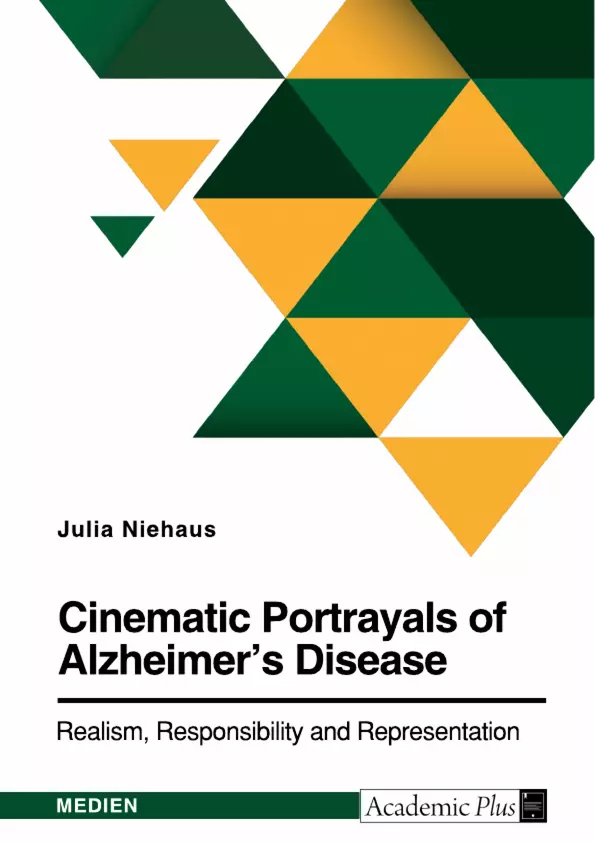
Cinematic Portrayals of Alzheimer's Disease. Realism, Responsibility, and Representation
Masterarbeit, 2023
87 Seiten, Note: 1,0
Leseprobe
Inhaltsverzeichnis (Table of Contents)
- Introduction
- Alzheimer's Disease
- Stages of Alzheimer's Disease
- Language and the Alzheimer's Brain
- Language Impairment
- Word- Finding and Lexical Processing Problems
- Understanding and Producing Language
- Syntax
- Discourse
- Methodology and Data
- Corpus Compilation
- Research Tool
- Methodological Approach and Data Analysis
- Chances and Limitations
- Data Analysis
- Still Alice
- Conceptualization of the film
- Analysis
- Iris
- Conceptualization of the film
- Analysis
- The Father
- Conceptualization of the film
- Analysis
- The Leisure Seeker
- Conceptualization of the film
- Analysis
- Supernova
- Conceptualization of the film
- Analysis
- Away from her
- Conceptualization of the film
- Analysis
- What they had
- Conceptualization of the film
- Analysis
- Still Alice
- Discussion
Zielsetzung und Themenschwerpunkte (Objectives and Key Themes)
This thesis explores the representation of Alzheimer's disease in film, analyzing how cinematic portrayals depict the linguistic challenges associated with this condition. The study aims to bridge the research gap in the linguistic representation of Alzheimer's disease and individuals affected by it in film, examining the extent to which films adequately illustrate these linguistic symptoms. The study seeks to understand the level of realism in films depicting Alzheimer's disease and its impact on audience understanding and sensitization towards this complex neurological disorder.
- The portrayal of linguistic impairment in Alzheimer's disease
- The accuracy and comprehensiveness of linguistic representations in film
- The impact of cinematic portrayals on audience understanding and sensitization
- The role of film as a medium for raising awareness about Alzheimer's disease
- The importance of accurate representation of Alzheimer's disease in film
Zusammenfassung der Kapitel (Chapter Summaries)
The introduction establishes the relevance of this study by highlighting the prevalence of Alzheimer's disease and the potential impact of film on public understanding. It emphasizes the importance of accurate and comprehensive representations in film, acknowledging the potential for misinformation due to time constraints and a focus on plot over accuracy. The introduction also presents the research gap regarding linguistic representations of Alzheimer's disease in film, highlighting the need for greater understanding of how these symptoms are depicted in cinematic narratives.
Chapter 2 provides a thorough overview of Alzheimer's disease, focusing on its stages, the impact on language and the brain, and the specific linguistic impairments that arise from the disease. This chapter delves into the intricacies of word-finding and lexical processing problems, as well as the challenges in understanding and producing language, syntax, and discourse. It serves as a foundational chapter, offering the reader a comprehensive understanding of Alzheimer's disease from a linguistic perspective.
Chapter 3 outlines the research methodology and data compilation process. It describes the compilation of a corpus of film examples depicting Alzheimer's disease and the selection criteria used. The chapter also details the research tool employed for data analysis, explaining the methodology and the approach used to analyze the linguistic representations of Alzheimer's disease within the chosen film corpus. The chapter concludes by discussing the potential chances and limitations associated with the research methodology.
Chapter 4 delves into the detailed data analysis of selected films, providing in-depth discussions of the linguistic representations of Alzheimer's disease in each film. The analysis examines how specific linguistic symptoms are portrayed, the level of accuracy and comprehensiveness, and the overall impact of the portrayal on the viewer's understanding and sensitization. This chapter provides detailed analyses of the films "Still Alice," "Iris," "The Father," "The Leisure Seeker," "Supernova," "Away from her," and "What they had."
Schlüsselwörter (Keywords)
This thesis focuses on the linguistic representations of Alzheimer's disease in film, examining the portrayal of language impairment, the accuracy of these representations, and the impact on audience understanding and sensitization. It utilizes the lens of linguistic analysis to explore the cinematic depiction of this complex neurological disorder, aiming to contribute to the broader conversation about the importance of accurate representations in film.
Details
- Titel
- Cinematic Portrayals of Alzheimer's Disease. Realism, Responsibility, and Representation
- Hochschule
- Universität Duisburg-Essen (Anglophone Studies)
- Note
- 1,0
- Autor
- Julia Niehaus (Autor:in)
- Erscheinungsjahr
- 2023
- Seiten
- 87
- Katalognummer
- V1442334
- ISBN (Buch)
- 9783963555428
- Sprache
- Englisch
- Anmerkungen
- With Academic Plus, GRIN offers its own imprint for outstanding theses from various subject areas. All titles are reviewed and selected by the GRIN editorial team. In their publications, our authors address current topics and issues that are at the center of social discussions. They provide well-founded information, precise analyses and concrete solutions for science and research.
- Schlagworte
- Alzheimer's film dementia movies still alice Iris The Father The Leisure Seeker Supernova Away from her
- Produktsicherheit
- GRIN Publishing GmbH
- Preis (Ebook)
- US$ 39,99
- Preis (Book)
- US$ 50,99
- Arbeit zitieren
- Julia Niehaus (Autor:in), 2023, Cinematic Portrayals of Alzheimer's Disease. Realism, Responsibility, and Representation, München, Page::Imprint:: GRINVerlagOHG, https://www.diplomarbeiten24.de/document/1442334
- Autor werden
- Ihre Optionen
- Vertriebskanäle
- Premium Services
- Autorenprofil
- Textarten und Formate
- Services für Verlage, Hochschulen, Unternehmen

- © GRIN Publishing GmbH.
- Alle Inhalte urheberrechtlich geschützt. Kopieren und verbreiten untersagt.
- info@grin.com
- AGB
- Open Publishing
Der GRIN Verlag hat sich seit 1998 auf die Veröffentlichung akademischer eBooks und Bücher spezialisiert. Der GRIN Verlag steht damit als erstes Unternehmen für User Generated Quality Content. Die Verlagsseiten GRIN.com, Hausarbeiten.de und Diplomarbeiten24 bieten für Hochschullehrer, Absolventen und Studenten die ideale Plattform, wissenschaftliche Texte wie Hausarbeiten, Referate, Bachelorarbeiten, Masterarbeiten, Diplomarbeiten, Dissertationen und wissenschaftliche Aufsätze einem breiten Publikum zu präsentieren.
Kostenfreie Veröffentlichung: Hausarbeit, Bachelorarbeit, Diplomarbeit, Dissertation, Masterarbeit, Interpretation oder Referat jetzt veröffentlichen!
- GRIN Verlag GmbH
-
- Nymphenburger Str. 86
- 80636
- Munich, Deutschland
- +49 89-550559-0
- +49 89-550559-10
- info@grin.com
-









